Agency Law in the Gig Economy: Evaluating Uber's Liability Risks
VerifiedAdded on 2023/05/30
|5
|1644
|295
Report
AI Summary
This report provides an analysis of agency law and its implications for Uber's liability within the gig economy. It begins by summarizing the core principles of agency law, including express, implied, and apparent authority, as well as ratification. The report then delves into the circumstances under which Uber, as a principal, might be held liable for the actions of its drivers, who operate as independent contractors. It considers scenarios involving vicarious liability, insurance coverage, and the potential for drivers to act outside their defined authority. Finally, the report recommends steps Uber can take to limit its legal exposure, such as providing comprehensive insurance, clearly defining expectations for drivers, and establishing guidelines for navigating situations involving apparent authority. The analysis emphasizes the importance of redefining the principal-agent relationship to mitigate ambiguity and vagueness, thereby safeguarding the company from legal and ethical liabilities.
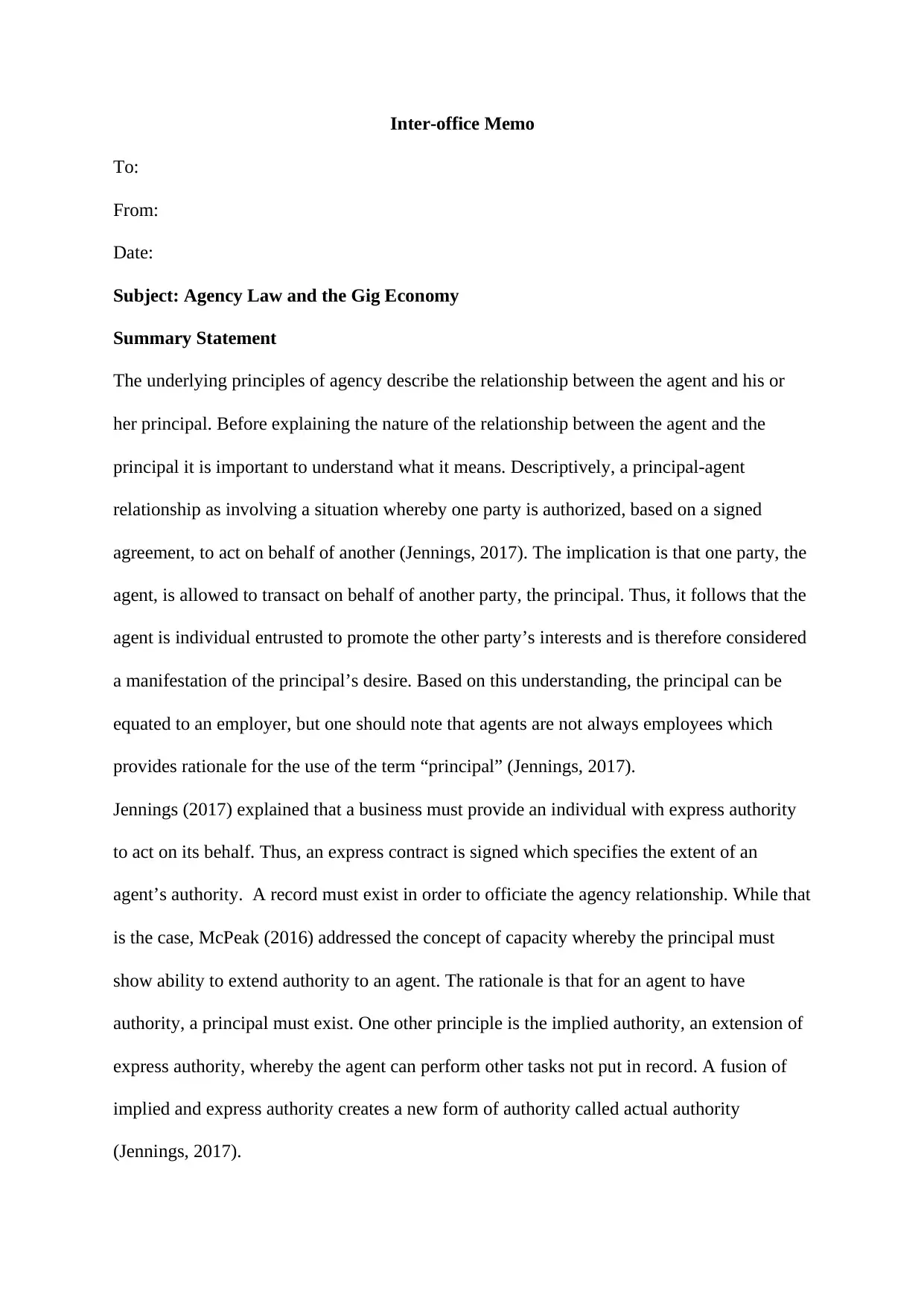
Inter-office Memo
To:
From:
Date:
Subject: Agency Law and the Gig Economy
Summary Statement
The underlying principles of agency describe the relationship between the agent and his or
her principal. Before explaining the nature of the relationship between the agent and the
principal it is important to understand what it means. Descriptively, a principal-agent
relationship as involving a situation whereby one party is authorized, based on a signed
agreement, to act on behalf of another (Jennings, 2017). The implication is that one party, the
agent, is allowed to transact on behalf of another party, the principal. Thus, it follows that the
agent is individual entrusted to promote the other party’s interests and is therefore considered
a manifestation of the principal’s desire. Based on this understanding, the principal can be
equated to an employer, but one should note that agents are not always employees which
provides rationale for the use of the term “principal” (Jennings, 2017).
Jennings (2017) explained that a business must provide an individual with express authority
to act on its behalf. Thus, an express contract is signed which specifies the extent of an
agent’s authority. A record must exist in order to officiate the agency relationship. While that
is the case, McPeak (2016) addressed the concept of capacity whereby the principal must
show ability to extend authority to an agent. The rationale is that for an agent to have
authority, a principal must exist. One other principle is the implied authority, an extension of
express authority, whereby the agent can perform other tasks not put in record. A fusion of
implied and express authority creates a new form of authority called actual authority
(Jennings, 2017).
To:
From:
Date:
Subject: Agency Law and the Gig Economy
Summary Statement
The underlying principles of agency describe the relationship between the agent and his or
her principal. Before explaining the nature of the relationship between the agent and the
principal it is important to understand what it means. Descriptively, a principal-agent
relationship as involving a situation whereby one party is authorized, based on a signed
agreement, to act on behalf of another (Jennings, 2017). The implication is that one party, the
agent, is allowed to transact on behalf of another party, the principal. Thus, it follows that the
agent is individual entrusted to promote the other party’s interests and is therefore considered
a manifestation of the principal’s desire. Based on this understanding, the principal can be
equated to an employer, but one should note that agents are not always employees which
provides rationale for the use of the term “principal” (Jennings, 2017).
Jennings (2017) explained that a business must provide an individual with express authority
to act on its behalf. Thus, an express contract is signed which specifies the extent of an
agent’s authority. A record must exist in order to officiate the agency relationship. While that
is the case, McPeak (2016) addressed the concept of capacity whereby the principal must
show ability to extend authority to an agent. The rationale is that for an agent to have
authority, a principal must exist. One other principle is the implied authority, an extension of
express authority, whereby the agent can perform other tasks not put in record. A fusion of
implied and express authority creates a new form of authority called actual authority
(Jennings, 2017).
Paraphrase This Document
Need a fresh take? Get an instant paraphrase of this document with our AI Paraphraser
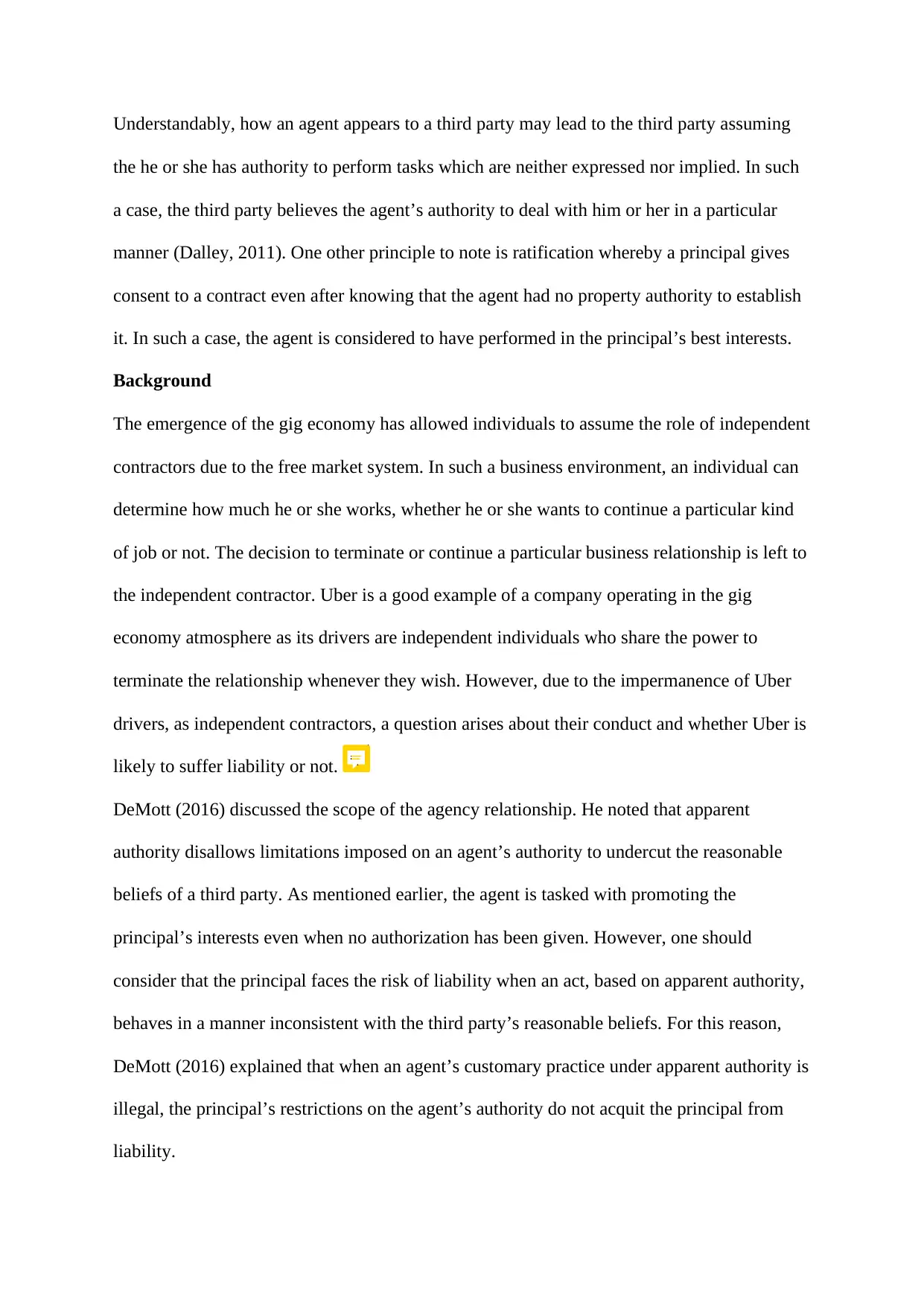
Understandably, how an agent appears to a third party may lead to the third party assuming
the he or she has authority to perform tasks which are neither expressed nor implied. In such
a case, the third party believes the agent’s authority to deal with him or her in a particular
manner (Dalley, 2011). One other principle to note is ratification whereby a principal gives
consent to a contract even after knowing that the agent had no property authority to establish
it. In such a case, the agent is considered to have performed in the principal’s best interests.
Background
The emergence of the gig economy has allowed individuals to assume the role of independent
contractors due to the free market system. In such a business environment, an individual can
determine how much he or she works, whether he or she wants to continue a particular kind
of job or not. The decision to terminate or continue a particular business relationship is left to
the independent contractor. Uber is a good example of a company operating in the gig
economy atmosphere as its drivers are independent individuals who share the power to
terminate the relationship whenever they wish. However, due to the impermanence of Uber
drivers, as independent contractors, a question arises about their conduct and whether Uber is
likely to suffer liability or not.
DeMott (2016) discussed the scope of the agency relationship. He noted that apparent
authority disallows limitations imposed on an agent’s authority to undercut the reasonable
beliefs of a third party. As mentioned earlier, the agent is tasked with promoting the
principal’s interests even when no authorization has been given. However, one should
consider that the principal faces the risk of liability when an act, based on apparent authority,
behaves in a manner inconsistent with the third party’s reasonable beliefs. For this reason,
DeMott (2016) explained that when an agent’s customary practice under apparent authority is
illegal, the principal’s restrictions on the agent’s authority do not acquit the principal from
liability.
the he or she has authority to perform tasks which are neither expressed nor implied. In such
a case, the third party believes the agent’s authority to deal with him or her in a particular
manner (Dalley, 2011). One other principle to note is ratification whereby a principal gives
consent to a contract even after knowing that the agent had no property authority to establish
it. In such a case, the agent is considered to have performed in the principal’s best interests.
Background
The emergence of the gig economy has allowed individuals to assume the role of independent
contractors due to the free market system. In such a business environment, an individual can
determine how much he or she works, whether he or she wants to continue a particular kind
of job or not. The decision to terminate or continue a particular business relationship is left to
the independent contractor. Uber is a good example of a company operating in the gig
economy atmosphere as its drivers are independent individuals who share the power to
terminate the relationship whenever they wish. However, due to the impermanence of Uber
drivers, as independent contractors, a question arises about their conduct and whether Uber is
likely to suffer liability or not.
DeMott (2016) discussed the scope of the agency relationship. He noted that apparent
authority disallows limitations imposed on an agent’s authority to undercut the reasonable
beliefs of a third party. As mentioned earlier, the agent is tasked with promoting the
principal’s interests even when no authorization has been given. However, one should
consider that the principal faces the risk of liability when an act, based on apparent authority,
behaves in a manner inconsistent with the third party’s reasonable beliefs. For this reason,
DeMott (2016) explained that when an agent’s customary practice under apparent authority is
illegal, the principal’s restrictions on the agent’s authority do not acquit the principal from
liability.
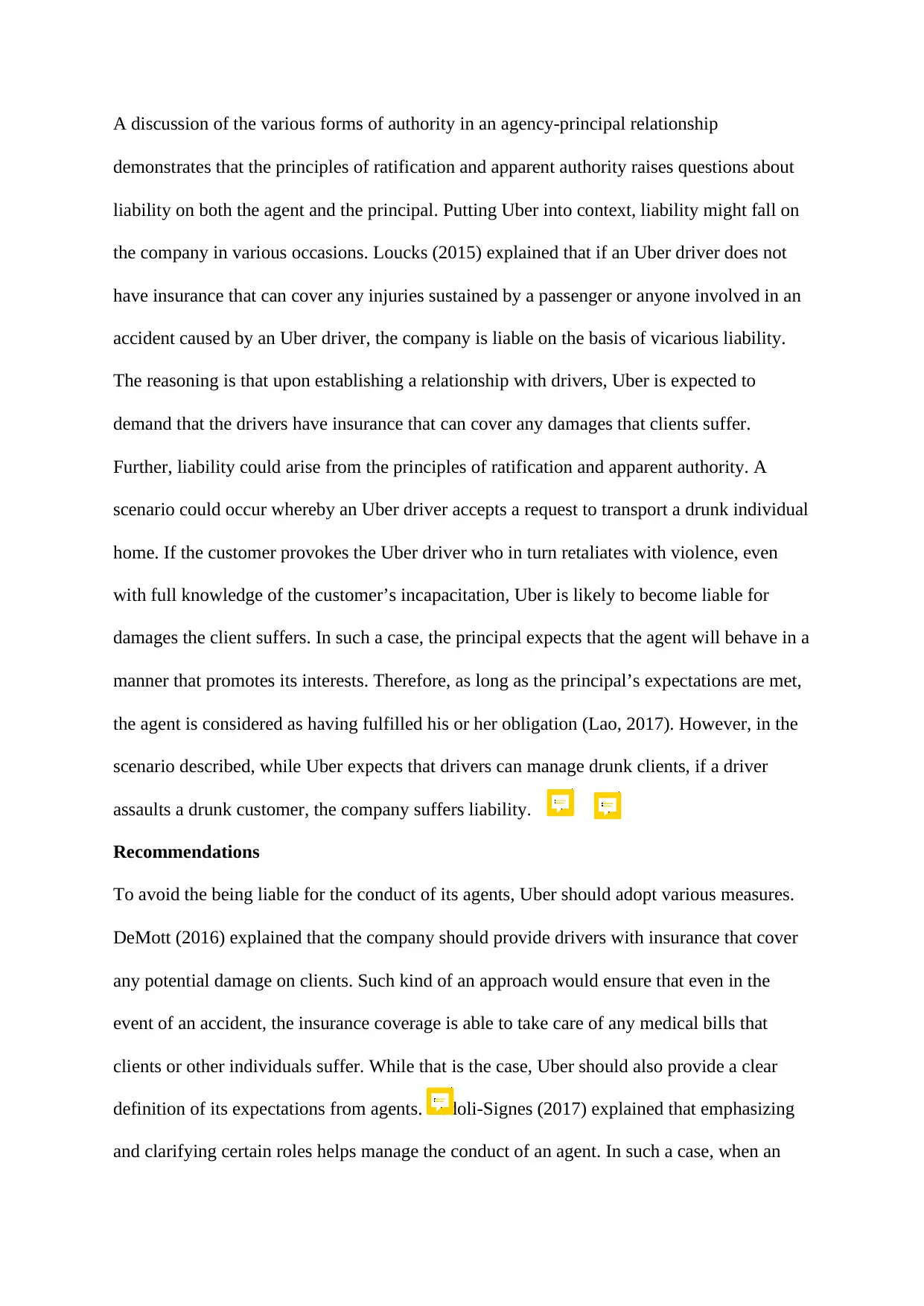
A discussion of the various forms of authority in an agency-principal relationship
demonstrates that the principles of ratification and apparent authority raises questions about
liability on both the agent and the principal. Putting Uber into context, liability might fall on
the company in various occasions. Loucks (2015) explained that if an Uber driver does not
have insurance that can cover any injuries sustained by a passenger or anyone involved in an
accident caused by an Uber driver, the company is liable on the basis of vicarious liability.
The reasoning is that upon establishing a relationship with drivers, Uber is expected to
demand that the drivers have insurance that can cover any damages that clients suffer.
Further, liability could arise from the principles of ratification and apparent authority. A
scenario could occur whereby an Uber driver accepts a request to transport a drunk individual
home. If the customer provokes the Uber driver who in turn retaliates with violence, even
with full knowledge of the customer’s incapacitation, Uber is likely to become liable for
damages the client suffers. In such a case, the principal expects that the agent will behave in a
manner that promotes its interests. Therefore, as long as the principal’s expectations are met,
the agent is considered as having fulfilled his or her obligation (Lao, 2017). However, in the
scenario described, while Uber expects that drivers can manage drunk clients, if a driver
assaults a drunk customer, the company suffers liability.
Recommendations
To avoid the being liable for the conduct of its agents, Uber should adopt various measures.
DeMott (2016) explained that the company should provide drivers with insurance that cover
any potential damage on clients. Such kind of an approach would ensure that even in the
event of an accident, the insurance coverage is able to take care of any medical bills that
clients or other individuals suffer. While that is the case, Uber should also provide a clear
definition of its expectations from agents. Todoli-Signes (2017) explained that emphasizing
and clarifying certain roles helps manage the conduct of an agent. In such a case, when an
demonstrates that the principles of ratification and apparent authority raises questions about
liability on both the agent and the principal. Putting Uber into context, liability might fall on
the company in various occasions. Loucks (2015) explained that if an Uber driver does not
have insurance that can cover any injuries sustained by a passenger or anyone involved in an
accident caused by an Uber driver, the company is liable on the basis of vicarious liability.
The reasoning is that upon establishing a relationship with drivers, Uber is expected to
demand that the drivers have insurance that can cover any damages that clients suffer.
Further, liability could arise from the principles of ratification and apparent authority. A
scenario could occur whereby an Uber driver accepts a request to transport a drunk individual
home. If the customer provokes the Uber driver who in turn retaliates with violence, even
with full knowledge of the customer’s incapacitation, Uber is likely to become liable for
damages the client suffers. In such a case, the principal expects that the agent will behave in a
manner that promotes its interests. Therefore, as long as the principal’s expectations are met,
the agent is considered as having fulfilled his or her obligation (Lao, 2017). However, in the
scenario described, while Uber expects that drivers can manage drunk clients, if a driver
assaults a drunk customer, the company suffers liability.
Recommendations
To avoid the being liable for the conduct of its agents, Uber should adopt various measures.
DeMott (2016) explained that the company should provide drivers with insurance that cover
any potential damage on clients. Such kind of an approach would ensure that even in the
event of an accident, the insurance coverage is able to take care of any medical bills that
clients or other individuals suffer. While that is the case, Uber should also provide a clear
definition of its expectations from agents. Todoli-Signes (2017) explained that emphasizing
and clarifying certain roles helps manage the conduct of an agent. In such a case, when an
⊘ This is a preview!⊘
Do you want full access?
Subscribe today to unlock all pages.

Trusted by 1+ million students worldwide
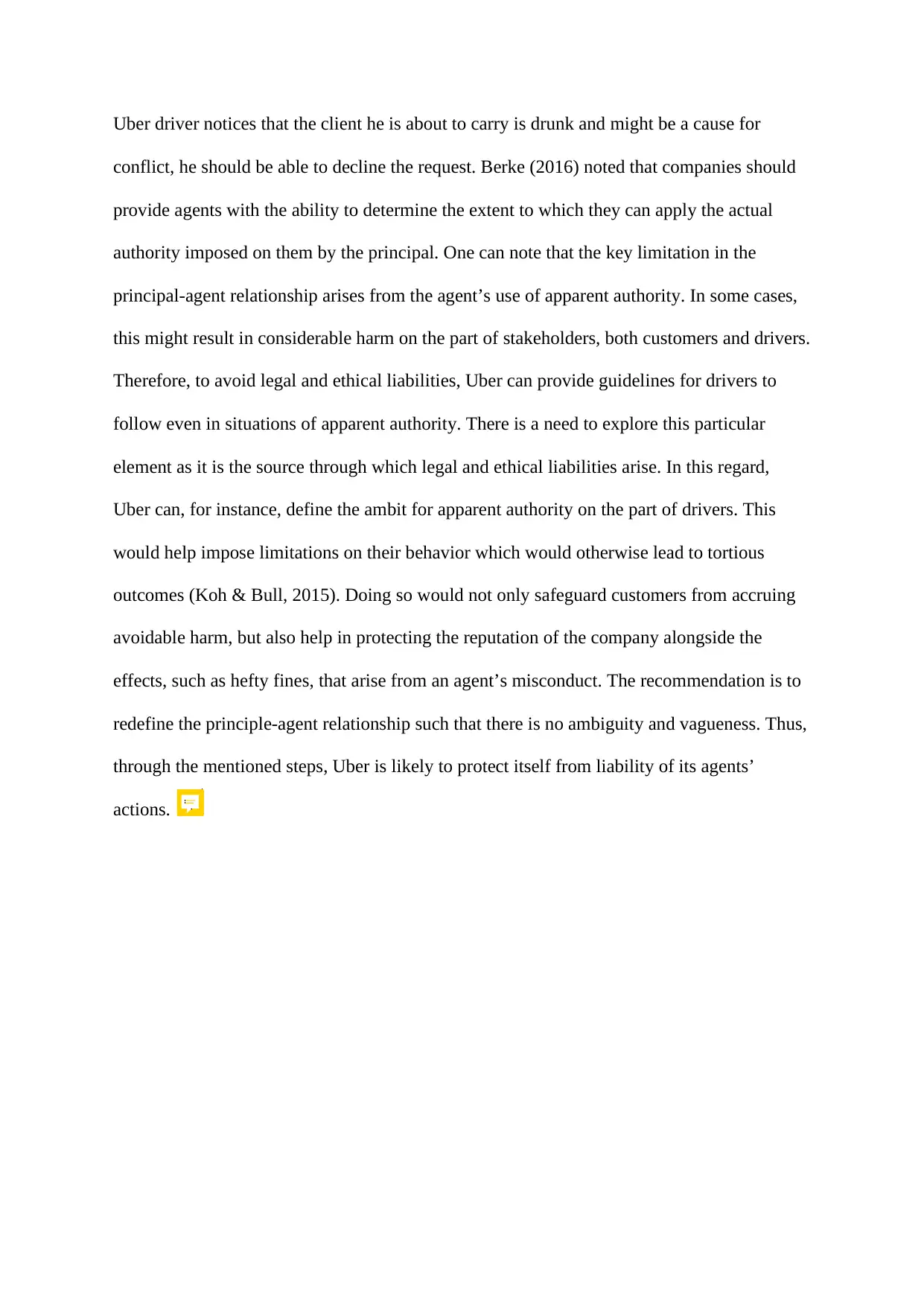
Uber driver notices that the client he is about to carry is drunk and might be a cause for
conflict, he should be able to decline the request. Berke (2016) noted that companies should
provide agents with the ability to determine the extent to which they can apply the actual
authority imposed on them by the principal. One can note that the key limitation in the
principal-agent relationship arises from the agent’s use of apparent authority. In some cases,
this might result in considerable harm on the part of stakeholders, both customers and drivers.
Therefore, to avoid legal and ethical liabilities, Uber can provide guidelines for drivers to
follow even in situations of apparent authority. There is a need to explore this particular
element as it is the source through which legal and ethical liabilities arise. In this regard,
Uber can, for instance, define the ambit for apparent authority on the part of drivers. This
would help impose limitations on their behavior which would otherwise lead to tortious
outcomes (Koh & Bull, 2015). Doing so would not only safeguard customers from accruing
avoidable harm, but also help in protecting the reputation of the company alongside the
effects, such as hefty fines, that arise from an agent’s misconduct. The recommendation is to
redefine the principle-agent relationship such that there is no ambiguity and vagueness. Thus,
through the mentioned steps, Uber is likely to protect itself from liability of its agents’
actions.
conflict, he should be able to decline the request. Berke (2016) noted that companies should
provide agents with the ability to determine the extent to which they can apply the actual
authority imposed on them by the principal. One can note that the key limitation in the
principal-agent relationship arises from the agent’s use of apparent authority. In some cases,
this might result in considerable harm on the part of stakeholders, both customers and drivers.
Therefore, to avoid legal and ethical liabilities, Uber can provide guidelines for drivers to
follow even in situations of apparent authority. There is a need to explore this particular
element as it is the source through which legal and ethical liabilities arise. In this regard,
Uber can, for instance, define the ambit for apparent authority on the part of drivers. This
would help impose limitations on their behavior which would otherwise lead to tortious
outcomes (Koh & Bull, 2015). Doing so would not only safeguard customers from accruing
avoidable harm, but also help in protecting the reputation of the company alongside the
effects, such as hefty fines, that arise from an agent’s misconduct. The recommendation is to
redefine the principle-agent relationship such that there is no ambiguity and vagueness. Thus,
through the mentioned steps, Uber is likely to protect itself from liability of its agents’
actions.
Paraphrase This Document
Need a fresh take? Get an instant paraphrase of this document with our AI Paraphraser
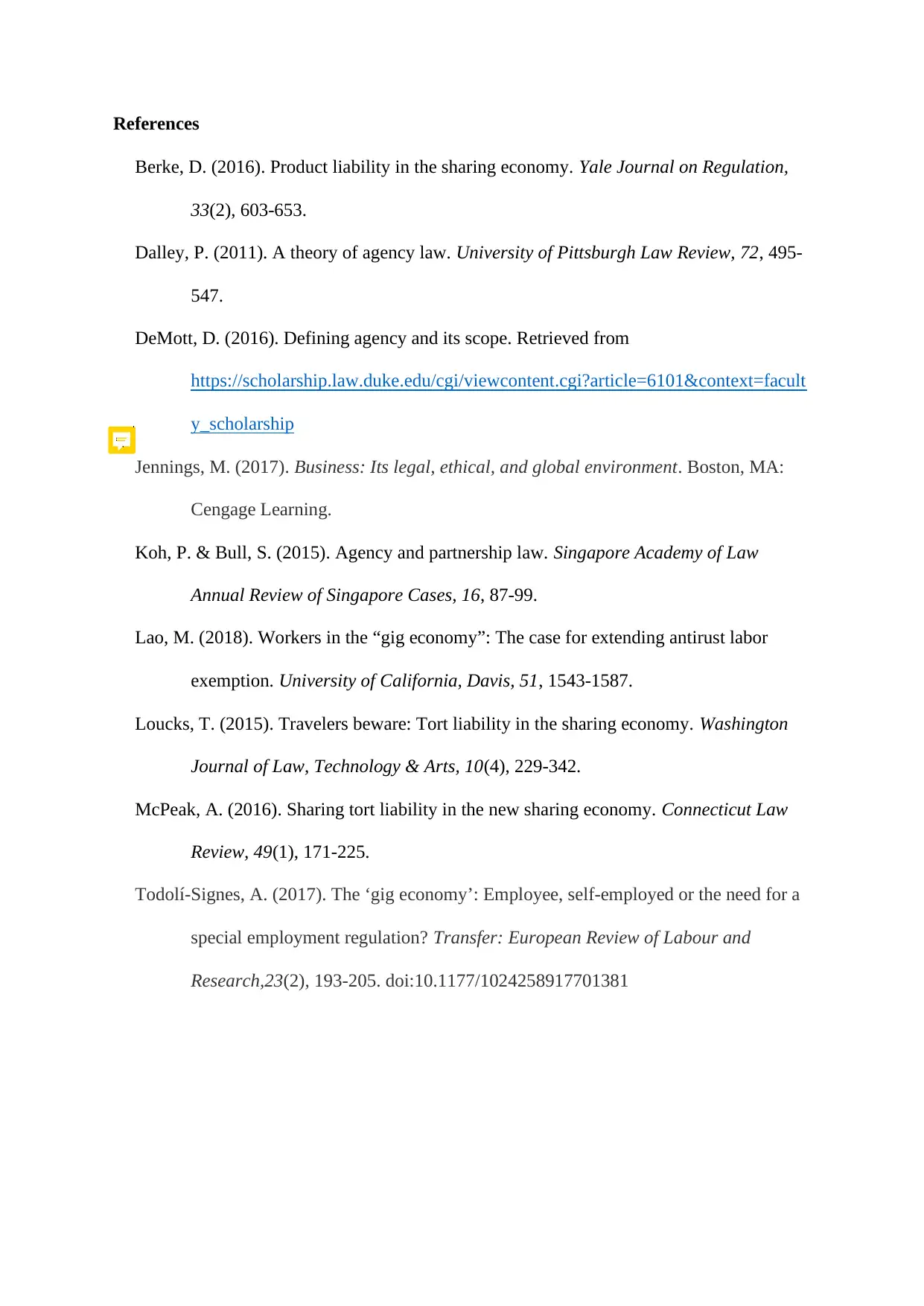
References
Berke, D. (2016). Product liability in the sharing economy. Yale Journal on Regulation,
33(2), 603-653.
Dalley, P. (2011). A theory of agency law. University of Pittsburgh Law Review, 72, 495-
547.
DeMott, D. (2016). Defining agency and its scope. Retrieved from
https://scholarship.law.duke.edu/cgi/viewcontent.cgi?article=6101&context=facult
y_scholarship
Jennings, M. (2017). Business: Its legal, ethical, and global environment. Boston, MA:
Cengage Learning.
Koh, P. & Bull, S. (2015). Agency and partnership law. Singapore Academy of Law
Annual Review of Singapore Cases, 16, 87-99.
Lao, M. (2018). Workers in the “gig economy”: The case for extending antirust labor
exemption. University of California, Davis, 51, 1543-1587.
Loucks, T. (2015). Travelers beware: Tort liability in the sharing economy. Washington
Journal of Law, Technology & Arts, 10(4), 229-342.
McPeak, A. (2016). Sharing tort liability in the new sharing economy. Connecticut Law
Review, 49(1), 171-225.
Todolí-Signes, A. (2017). The ‘gig economy’: Employee, self-employed or the need for a
special employment regulation? Transfer: European Review of Labour and
Research,23(2), 193-205. doi:10.1177/1024258917701381
Berke, D. (2016). Product liability in the sharing economy. Yale Journal on Regulation,
33(2), 603-653.
Dalley, P. (2011). A theory of agency law. University of Pittsburgh Law Review, 72, 495-
547.
DeMott, D. (2016). Defining agency and its scope. Retrieved from
https://scholarship.law.duke.edu/cgi/viewcontent.cgi?article=6101&context=facult
y_scholarship
Jennings, M. (2017). Business: Its legal, ethical, and global environment. Boston, MA:
Cengage Learning.
Koh, P. & Bull, S. (2015). Agency and partnership law. Singapore Academy of Law
Annual Review of Singapore Cases, 16, 87-99.
Lao, M. (2018). Workers in the “gig economy”: The case for extending antirust labor
exemption. University of California, Davis, 51, 1543-1587.
Loucks, T. (2015). Travelers beware: Tort liability in the sharing economy. Washington
Journal of Law, Technology & Arts, 10(4), 229-342.
McPeak, A. (2016). Sharing tort liability in the new sharing economy. Connecticut Law
Review, 49(1), 171-225.
Todolí-Signes, A. (2017). The ‘gig economy’: Employee, self-employed or the need for a
special employment regulation? Transfer: European Review of Labour and
Research,23(2), 193-205. doi:10.1177/1024258917701381
1 out of 5
Related Documents
Your All-in-One AI-Powered Toolkit for Academic Success.
+13062052269
info@desklib.com
Available 24*7 on WhatsApp / Email
![[object Object]](/_next/static/media/star-bottom.7253800d.svg)
Unlock your academic potential
Copyright © 2020–2026 A2Z Services. All Rights Reserved. Developed and managed by ZUCOL.





